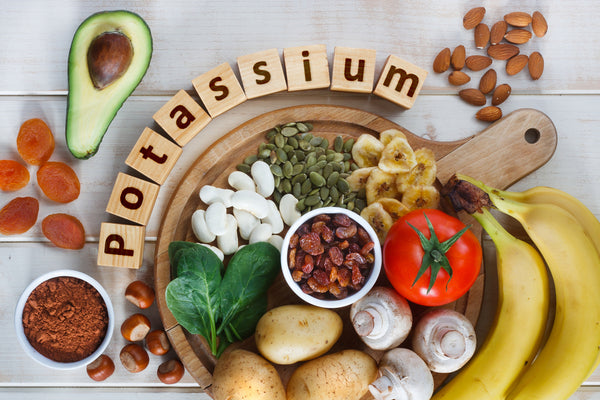When it comes to vitamins and minerals, confusion can often arise due to similar names or functions. One common misconception is the mix-up between Vitamin K and potassium. While both are essential for overall health, they are not the same thing. Vitamin K is a group of fat-soluble vitamins essential to blood clotting and bone health, while potassium is a mineral that helps regulate your body's fluid balance, nerve signals, and muscle contractions. Let's delve into the differences between Vitamin K and potassium, specifically Vitamin K1 and K2.
Is Vitamin K the Same as Potassium?
No, vitamin K and potassium are two different nutrients that play distinct roles in the body.
Vitamin K is a fat-soluble vitamin that is essential for blood clotting and bone health. There are different forms of vitamin K, with vitamin K2 being especially important for cardiovascular health. On the other hand, potassium is a mineral that helps regulate fluid balance, nerve function, and muscle contractions. While both nutrients are important for overall health, they are not the same and serve different functions. It's important to get enough vitamin K through sources like green leafy vegetables, dairy products, and fermented foods, while potassium can be found in bananas, avocados, and potatoes.
Key Differences Between Vitamin K and Potassium

Vitamin K2 and potassium are both essential nutrients, but they serve different roles in the body. Understanding their differences is crucial for maintaining optimal health. Here are the key distinctions between vitamin K2 and potassium:
- Chemical Composition: Vitamin K2 is a fat-soluble vitamin, while potassium is a mineral. This means that vitamin K2 is stored in the body's fat tissues and liver, while potassium is primarily found in the body's cells and fluids.
- Function: Vitamin K2 plays a vital role in blood clotting and bone health. It activates proteins that help with blood clotting and regulates calcium in the bones and blood vessels. Potassium, on the other hand, is an electrolyte that helps regulate electrolyte balance, muscle contractions, and nerve signals.
- Sources: Vitamin K2 is found in animal products like meat, eggs, and dairy, as well as fermented foods like natto and sauerkraut. Potassium is prevalent in fruits and vegetables, especially bananas, oranges, potatoes, and spinach.
- Deficiency and Toxicity: A deficiency in vitamin K2 can lead to excessive bleeding and weakened bones, while a potassium deficiency can cause muscle weakness, cramps, and irregular heartbeat. Excessive intake of vitamin K2 is rare because the body typically excretes any excess through urine. On the other hand, too much potassium can lead to hyperkalemia, which can be life-threatening. Too much of either nutrient can have adverse side effects, so it is important to consume appropriate safe amounts as recommended by your healthcare provider or your trusted supplement brand.
- Supplementation: Vitamin K2 supplements are available in various forms, including MK-4 and MK-7. Potassium supplements are also available, but they are usually only recommended for those with a deficiency or specific medical conditions.
In conclusion, while both vitamin K2 and potassium are essential for overall health, they have different functions and sources. It's important to consume a balanced diet that includes a variety of foods rich in both nutrients to maintain optimal health.
Vitamin K1 and K2
Vitamin K1 and Vitamin K2 are two forms of vitamin K, which is a fat-soluble vitamin essential for blood clotting and bone health.
- Vitamin K1, also known as phylloquinone, is mainly found in green leafy vegetables like spinach, kale, and broccoli. The primary function of vitamin K1 is to support blood clotting. It is essential for the production of clotting factors in the liver, which are necessary for the blood to clot properly.
- Vitamin K2, also known as menaquinone, is found in animal products and fermented foods like cheese and natto. Vitamin K2 is recognized for its role in bone health. It activates proteins that help regulate calcium metabolism, ensuring that calcium is deposited in the bones and teeth rather than in the blood vessels or soft tissues.
Both forms of vitamin K play a crucial role in maintaining healthy bones and preventing excessive bleeding by helping the blood to clot properly. Vitamin K2 has also been linked to cardiovascular health and may help reduce the risk of heart disease. It is important to ensure an adequate intake of both forms of vitamin K through a balanced diet to support overall health and well-being.
Potassium
Potassium is a crucial mineral that our bodies need to function properly. It plays a key role in maintaining healthy potassium levels in the body, which are essential for various bodily functions.
Some of the main benefits of potassium include:
- Regulating fluid balance
- Muscle contractions
- Nerve signals
This mineral also helps to lower blood pressure by offsetting sodium's effects in the body. In addition, potassium is involved in maintaining proper heart function, as it helps with the electrical impulses that keep the heart beating regularly. It also aids in proper digestion, metabolism, and overall energy levels. Ensuring an adequate intake of potassium through a balanced diet can help support overall health and well-being. Consult a healthcare practitioner if you are considering potassium supplements because high levels of potassium can be dangerous considering its role in important bodily functions such as your cardiovascular system.
When to Supplement with Vitamin K

Vitamin K is a vital nutrient that plays a pivotal role in blood clotting and bone health. There are two primary forms of vitamin K2 available in supplement form: MK-4 and MK-7, each with distinct functions and sources.
- MK-4 (Menatetrenone): MK-4 is the synthetic form of vitamin K2 and is primarily found in animal-based foods like meat, eggs, and dairy products. It has a shorter half-life compared to MK-7 and is often used in clinical settings for specific purposes.
- MK-7 (Menaquinone-7): MK-7 is the natural form of vitamin K2 and is found in fermented foods like natto (a traditional Japanese dish made from fermented soybeans) and certain types of cheese. It has a longer half-life compared to MK-4 and is believed to have a more significant impact on bone health.
Vitamin K supplements may be necessary in certain cases where individuals are at risk of deficiency or have specific health conditions that affect vitamin K absorption or utilization. Here are some scenarios where vitamin K supplementation may be considered:
- Certain Medications May Interfere with Vitamin K Absorption: Certain medications, such as antibiotics or blood thinners, can interfere with the absorption or utilization of vitamin K. Individuals taking these medications may need vitamin K supplementation to maintain adequate levels of this essential nutrient.
- Conditions Affecting Fat Absorption: Health conditions that affect fat absorption, such as Crohn's disease, celiac disease, or liver disease, can impair the absorption of fat-soluble vitamins like vitamin K. In such cases, supplementation may be necessary to ensure sufficient vitamin K levels.
- Bone Health Concerns: Individuals with osteoporosis, osteopenia, or a history of bone fractures may benefit from vitamin K supplementation. Vitamin K plays a crucial role in bone health by regulating calcium and promoting bone mineralization. Some studies suggest that vitamin K supplementation, particularly with vitamin K2, may help improve bone density and reduce the risk of fractures.
- Pregnancy and Breastfeeding: Pregnant and breastfeeding women may have increased vitamin K requirements. Vitamin K supplementation may be recommended during pregnancy and lactation to support maternal and fetal health.
- Vitamin K Deficiency: Individuals with a confirmed vitamin K deficiency, as indicated by blood tests, may require supplementation to correct the deficiency and prevent associated health issues, such as excessive bleeding or impaired bone health.
- Combining with Vitamin D: Vitamin K supplementation may be considered in conjunction with vitamin D supplementation for individuals at risk of bone health issues. Vitamin D is essential for calcium absorption, while vitamin K helps regulate calcium and prevent its accumulation in soft tissues. Combining these vitamins can have a synergistic effect on bone health.
- Specific Dietary Patterns: Individuals following restrictive diets that limit sources of vitamin K, such as vegan diets or diets low in green leafy vegetables, may need vitamin K supplementation to ensure adequate intake.
In conclusion, while most people obtain sufficient vitamin K from their diet, certain situations, such as medication interactions or specific health conditions, may warrant supplementation. Additionally, combining vitamin K with vitamin D can have a positive impact on bone health. Seek professional guidance to ensure that supplementation is appropriate for your individual needs.
When to Supplement with Potassium

Potassium intake is essential for maintaining proper nerve and muscle function and regulating fluid in the body. While most people can meet their daily potassium needs through a balanced diet rich in fruits, vegetables, and whole grains, there are certain circumstances where supplementing with potassium may be necessary. However, its important to consult a healthcare provider before potassium supplementation since high levels of potassium can be dangerous.
- Low Potassium Levels (Hypokalemia): Certain medical conditions, such as kidney disease, gastrointestinal disorders (e.g., diarrhea, vomiting), or excessive sweating, can lead to low potassium levels. Individuals with these conditions may require potassium supplementation to maintain normal potassium levels.
- Diuretics: Some medications, such as diuretics (water pills), can increase potassium excretion through urine, leading to low potassium levels. In such cases, potassium supplementation may be necessary to prevent deficiency.
- Athletes and Active Individuals: Athletes and individuals engaged in intense physical activity may experience increased potassium losses through sweat. In such cases, potassium supplementation may help replenish lost potassium and support muscle function.
- Sodium-Potassium Balance: Maintaining a proper balance of sodium and potassium is essential for overall health. Individuals with high sodium intake or low potassium intake may benefit from potassium supplementation to support a healthy sodium-potassium balance.
- Low-Potassium Diets: Individuals following restrictive diets that limit sources of potassium, such as low-carbohydrate diets or diets low in fruits and vegetables, may need potassium supplementation to ensure adequate intake.
In conclusion, while most people obtain sufficient potassium from their diet, certain situations, such as medical conditions, medication use, or specific dietary patterns, may warrant supplementation. It's crucial to seek professional guidance to ensure that supplementation is appropriate for your individual needs.
Key Takeaways
Potassium and vitamin K are different nutrients. Potassium is a mineral, while vitamin K is a vitamin. While both are essential nutrients for the body, they serve different functions. Vitamin K is necessary for blood clotting and bone health, while potassium plays a role in maintaining proper heart function and muscle contractions. It is important to include an adequate amount of both potassium and vitamin K in your diet to support overall health. Some sources rich in potassium include bananas, potatoes, and leafy green vegetables, while vitamin K rich foods include broccoli, spinach, and brussels sprouts. Be sure to consume a balanced diet to ensure you are getting enough of both nutrients. If you have inadequate levels of potassium or vitamin K, consider supplementation and discuss your needs with your healthcare provider.